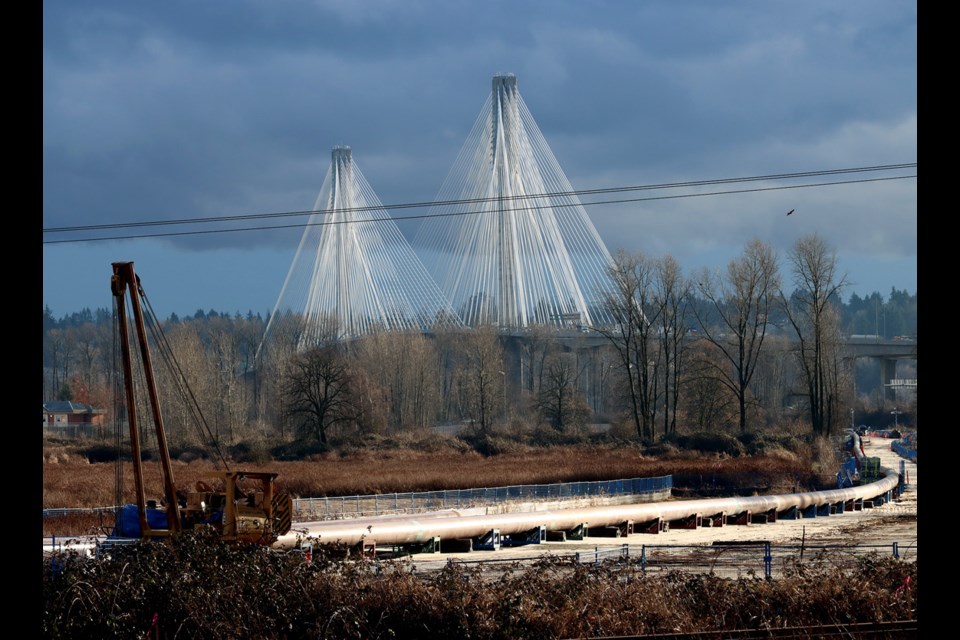Will digging a new pipeline in Coquitlam cause sinkholes along the Mary Hill Bypass?
The Highway 7B route is a crucial link between Highway 1, to Coquitlam, Port Coquitlam and Maple Ridge, and handles thousands of vehicles a day, which back up by the hundreds in each direction at major intersections during rush hour.
But a recent sinkhole that caused traffic delays eastbound on the Mary Hill bypass in early December during the dig from Surrey has come under scrutiny by local environmentalists, the mayor of Coquitlam as well as the Ministry of Transportation.
And while Trans Mountain has sensors to detect settling in the area of its pipeline dig and hasn't found evidence of further settling on the route since Dec. 5, questions remain.
Now, more than a month after the sinkhole occurred, Trans Mountain has confirmed that a soil collapse was a known risk with digging under the highway for a new pipeline.
The admission was made in a response to the Canadian Energy Regulator (CER), which requested more information from the company to answer concerns raised by three anti-pipeline groups.
Stop TMX, Pipe Up and the BC Environmental Network have filed letters with the CER to deny Trans Mountain's proposal to relocate and re-drill 350 metres of its new pipeline tunnel under the Fraser River after issues relating to an equipment failure occurred in November.
In their submissions, the groups question whether Trans Mountain did sufficient bore hole testing, is confident the revised route to Coquitlam won't add stress to the underwater pipe, chose the best drilling method, has enough insurance to cover spills and isn't overly rushed.
Trans Mountain's response to all concerns is that it has chosen the best methods, which were previously approved, and is not being rushed.
However, it does admit sinkholes were a prior consideration.
"Sinkholes are a known risk in the area of the Mary Hill bypass that are related to ground conditions and not the speed at which drilling is undertaken, which has not changed," the submission to CER states.
Still, it is asking for a route deviation so it can re-drill an area after an equipment failure halted the project in mid-November.
To prevent future sinkholes added protection will be provided for the pipe to prevent the risk of future settling in two boreholes it must dig to accommodate the pipeline route.
"A casing pipe will be installed in the soil and will provide a pathway for installation of the product pipe," stated a Trans Mountain spokesperson in an email to the Tri-City News.
"Up to 130m of casing will be installed in the soft soils on the north side of the river through which the pipe will be pulled."
The fact that digging under the Mary Hill bypass caused a sinkhole doesn't surprise Coquitlam Mayor Richard Stewart.
Stewart, who has seen several large digs in the region, said unstable soils can settle and cause sinkholes, something that occurred during tunnelling for the Evergreen Extension of the SkyTrain line through Port Moody, as well as when a pipe was dug by Fortis under Mariner Way.
The city is in contact with Trans Mountain on the safety of its dig under the Mary Hill bypass, Stewart said.
"Those [sinkholes] are alarming to the city and alarming to the residents. We’ve been on them very firmly to make sure that they take the steps necessary to make sure that doesn’t get repeated," Stewart said.
The Ministry of Transportation is also keeping on top of any future digging under the Mary Hill bypass.
In a statement to the Tri-City News, a ministry spokesperson said Trans Mountain continues to monitor for settlement near where the sinkhole was filled in.
"The area is observed each day to confirm the sinkhole backfill is not settling. No settlement has been observed since December 5, 2021. In addition, the site is subject to instrument surveying and ground penetration radar monitoring several times a week."
Meanwhile, the environmental groups continue to press their case that the pipeline should be halted because it could endanger the Fraser River.
A well, six NDP Members of Parliament, including Port Moody-Coquitlam MP Bonita Zarrillo, sent an open letter to CER and to Minister of Natural Resources, Jonathon Wilkinson, requesting the rejection of Trans Mountain’s plans until more background studies are done.
In a response to the Tri-City News, Trans Mountain confirmed that construction methods for the Fraser River Horizontal Directional Drilling (HDD) have been reviewed and approved and "top local subject matter experts" are overseeing the design, execution and monitoring."



